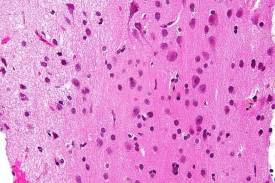There are a lot of nasty long-term health consequences to alcohol abuse. This can range from cirrhosis of the liver, to pancreatitis, and cancer amongst many others. However, the dangers of brain damage from alcohol abuse are often misunderstood and sometimes even overblown.
While wet brain is a very real condition that can potentially cause irreversible damage if left untreated, it isn’t caused by alcohol “killing brain cells” as the common myth would have you believe. Rather, wet brain arises due to thiamine deficiency because alcohol inhibits the ability’s ability to absorb thiamine. This can be largely offset by proper nutrition and thiamine supplementation.
Contents
What About Brain Shrinkage?
It is largely established that alcoholics have smaller brain volume than non-alcoholics. This is where the myth that alcohol kills brain cells comes from – because early researchers thought the smaller brain volume was primarily due to brain cell death.


High magnification view of the brain, showing white and gray brain matter
The gray cells in the human brain are primarily responsible for thinking, feeling, and other high level cognitive function. The white brain cells are primarily responsible for transmitting signals within the brain.
A 1993 study by Jensen and Pakkenberg found that the number of gray cells in heavy chronic drinkers and non-drinkers were essentially the same. The study also found that heavy chronic drinkers did have fewer white brain cells than non-drinkers. Another study in 2009 by George Fein uncovered that long term, heavy drinking could kill gray brain cells in one area of the brain – the parietal lobe. According to Fein’s research, this is why many recovered long-term alcoholics sometimes have trouble with spatial processing, even when their other cognitive functions have returned back to normal.

Brain shrinkage in alcoholics does cause cognitive dysfunction – as anyone who has spent time around a sober long-time alcoholic knows. However, this brain shrinkage and the accompanying cognitive dysfunction will often go away once the alcoholic recovers and maintains a long period of abstinence from alcohol.
Brain Returning To Normal Function After Abstinence
So how long does it take to recover from alcohol brain damage? Unless there has been prolonged thiamine deficiency or liver failure leading to brain damage, a heavy drinker’s brain cells are still mostly intact – even though their brain may have shrunk temporarily due to alcohol abuse. Because alcohol doesn’t kill gray brain cells (except possibly in the parietal lobe), the bulk of an alcoholic’s cognitive ability will return after a period of abstinence or moderate drinking, and their brain size will return to normal.
Here is a list of cognitive functions and how long it takes for them to return (on average) after an alcoholic stops drinking (provided there is wet brain or heptic encephalopathy).
Return of Cognitive Functions
Acute Detox (Less than 2 weeks)
- None
Early Abstinence (2 weeks – 2 months)
- No longer experiencing mild confusion
- Mild confusion
- Reduced irritability
- Reduced distractibility
Mid-Range Abstinence (2 months – 5 years)
- Improved reaction times
- Restored attention and concentration
- Restored verbal learning ability, abstract reasoning, and short-term memory.
Long-Term Abstinence (7 years)
- Restored non-verbal abstract reasoning ability
- Restored mental flexibility
- Restored nonverbal short-term memory
- Potential improvement in Visuospatial abilities
Conclusion
Drinking heavily on a daily basis is not good for your health and can certainly lead to an early grave. It can also lead to severe healthy problems long after you’ve stopped drinking. But a lot of the information being passed around about alcohol and brain damage is outdated. This information can also be extremely disheartening to recovery alcoholics who are trying to cope with the effects of years of alcohol abuse.
The good news is that research has shown time and time again that most alcoholic brain damage can be reversed with prolonged sobriety, and even with prolonged periods of moderate drinking. Even those suffering from the early stages of Wet Brain can experience a full recovery with the right treatment and abstinence.
The important thing to keep in mind is that a lot of this recovery takes a long time to happen. In the short-term, you might not see too much improvement after quitting drinking. But over the long haul, alcoholics can expect to see significant recovery with prolonged abstinence.
Please note: None of the above is medical advice, and I am not a medical doctor nor a scientific researcher. This is simply my understanding based on what I’ve read, and what I’ve been told by individuals much more qualified than myself. Please consult a qualified medical professional before making any medical decisions.





{ 0 comments… add one now }
You must log in to post a comment.